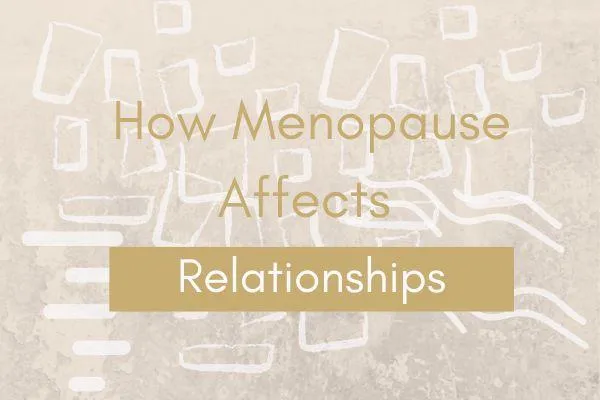Blog
Menopause Midlife & all the ****

How Menopause Affects Relationships
"All of a sudden I don't mind saying to people, 'You know what? Get out of my life. You're not right for me.’ It's wonderful and liberating." - Whoopi Goldberg
Introduction:
As we gracefully age, our lives undergo a series of transformations. Family dynamics shift with the ebb and flow of our children's changing lives, relationships evolve, and work dynamics may need to undertake adjustments. During midlife, these changes may be further heightened by the often tumultuous journey of menopause. It is therefore imperative that we nurture, maintain and understand our relationship dynamics at this time and how those hormones can manipulate them.

This page contains affiliate links. If you choose to purchase after clicking a link, I may receive a commission at no extra cost to you.
The Hormonal Rollercoaster
As we are aware the main players, progesterone and oestrogen, have decided it's time to pack their bags and do one. This departure isn't without consequences. As these hormones bid farewell, they leave us grappling with a myriad of challenges that can reverberate through various facets of our lives, particularly within our relationships.
The hormonal shift isn't just a physiological phenomenon; it's a full-blown rollercoaster affecting our emotions, self-esteem, and stress levels. Cortisols kick in, due to the decrease in the previous hormonal buffer supplied by those female hormones, thereby amplifying anxiety levels, and all these changes can significantly influence how we perceive ourselves and, subsequently, how we navigate our relationships and how those around us navigate us too.
The Emotional Landscape of Menopause
Menopause isn't just a biological transition; it's an emotional odyssey. The sudden departure of hormones can create a whirlwind of emotions, from profound self-consciousness to a dip in self-confidence. It's crucial to recognise that these emotional upheavals can extend beyond personal introspection and profoundly impact how we interact with our partners. The brain, previously used to the nurture effect of our female hormones, now has a new landscape to navigate, without that nurture effect.
The Struggle for Self-Identity
As hormonal changes reshape our internal landscape, there's often a parallel struggle to maintain a sense of self-identity. The external manifestations of menopause, such as hot flashes and memory lapses, can lead to moments of self-doubt. This struggle can echo in our relationships, as partners grapple with the evolving dynamics and we seek to redefine our roles.
The Dance of Symptomatic Intricacies
Menopause introduces us to a repertoire of symptoms, each with its own unique dance. Hot flashes, memory lapses, fatigue, and unexpected hair growth—they all join the performance. With over 40 symptoms in the ensemble, it's a spectacle that inevitably spills over into our interactions with others. People around us witness these changes, and as we age, societal perceptions alter. The expectations placed on us evolve, and this dynamic plays a pivotal role in our relationships.
Societal Expectations and Relationship Dynamics
As societal expectations shift with age, so do the dynamics within our relationships. The supportive partner or colleague we once knew may find themselves navigating uncharted territory. It's essential to recognise that these shifts are not only physiological but also sociological.
The Twofold Nature of Relationships
Relationships in midlife serve a dual purpose. On one side, they are our pillars of support, offering guidance, understanding, and a boost to our confidence. On the other side, they need to adapt and exhibit understanding of our journey through menopause. The challenge lies in maintaining an open dialogue during a period when we ourselves might struggle to comprehend the changes we're undergoing.
Navigating Communication Challenges
Communication is the linchpin of successful relationships during menopause. Expressing our thoughts, fears, and triumphs is vital for fostering understanding. However, the hormonal turbulence can make this communication challenging. Exploring effective communication strategies tailored to the nuances of menopause becomes paramount for relationship sustainability.
The Role of Mutual Understanding
For relationships to thrive amid menopausal changes, a mutual understanding must be cultivated. This understanding extends beyond the surface-level symptoms and delves into the emotional intricacies of the journey. Partners need to navigate the complexities of menopause together, creating a shared narrative that strengthens the bonds of empathy and connection.
Navigating the Dialogue
Communication is key. It's essential that those close to us, be it in personal or work-related spheres, are aware of our struggles and triumphs. Menopause introduces a level of complexity that may leave both us and those around us uncertain of how to navigate the emotional terrain. This uncertainty can manifest in short tempers or unpredictable mood swings, for which we and those who come int o contact with us may not be able to navigate at all times.
Establishing Emotional Resilience
Navigating the dialogue requires emotional resilience on both ends. While menopausal women grapple with the changes within themselves, partners also need to develop and understanding of these hormonal implications. Open conversations about fears, expectations, and the evolving nature of the relationship are pivotal for building this resilience.
The Impact on Work Relationships
Beyond personal relationships, the effects of menopause extend to the workplace. Colleagues and superiors may witness the ebbs and flows of menopausal symptoms. Creating an atmosphere of understanding and support within the professional sphere is crucial for maintaining a healthy work-life balance during this transformative phase.
The Relationship Checkpoint
Menopause not only changes the way we feel about ourselves but also how others perceive us. If these changes are met with judgment or a lack of support, it prompts a critical reflection not just on the external factors but on the relationship itself.
The Evolution of Relationship Dynamics
As relationships weather the storm of menopause, they inevitably evolve. This evolution may involve renegotiating boundaries, redefining roles, and rediscovering shared passions. It's a dynamic process that requires introspection and a commitment to adapting to the changes both partners are experiencing.
Professional Guidance for Relationship Health
Seeking professional guidance during this phase is not a sign of weakness but an acknowledgment of the complexities involved. Relationship support can provide a safe space for couples to navigate the uncharted territory of menopause, fostering communication and understanding.
Conclusion: Embracing the Journey Together
In the midst of this hormonal rollercoaster, it's crucial to remember that support and understanding are non-negotiable. If our relationships are not adapting to the changes we're experiencing, it might be time for a reassessment.
As we navigate the complexities of menopause, let's foster open dialogues, embrace the changes within ourselves, and encourage our partners to embark on this transformative journey with us. Relationships that weather the storm emerge stronger, and menopause, rather than a challenge, becomes an opportunity for growth and deeper connection.
The Power of Shared Experiences
Connecting with others who are navigating similar journeys can amplify the strength of our relationships. Creating a community of support, whether online or in-person, allows for the exchange of insights, coping strategies, and shared triumphs. This communal aspect enhances the journey, making it a collective endeavor rather than a solitary struggle.
Celebrating Milestones Together
As menopause unfolds, there are milestones to be celebrated. Each triumph over a challenging symptom, every moment of understanding between partners, and each step forward in the journey deserves acknowledgment. Celebrating these milestones together reinforces the resilience of our relationships and strengthens the bond forged through shared experiences.
Continuation of the Menopause Journey:
The menopause journey is a continuum. From perimenopause and on through into postmenopause, having people who understand and support you is essential. It's not the end of your life's journey; it's a phase, and having the right community can make all the difference.
I make it my mission to support women with their transition along the menopause journey.
If you would like to join a supportive community, please drop me a line here. I love hearing from midlife women going through the menopausal transition.
Pssst, you can also check out my Menopause Midlife and all the ****. It includes monthly strategies and a community of women at the same life stage as you.
Click here to get your Menopause Morning Rituals to make every day just that little bit easier.
Oh, and come say Hi on Facebook and join the free facebook group Menopause Midlife and all the **** here.
Here's the video for those of you who prefer
Check out other resources here:
An Holistic Approach To Menopause
Your Menopause Self-Mastery Checklist:
Here is a quick checklist for you to think about when taking back control and getting back on track during your menopause transition.
Embrace self-care during menopause
Develop resilience through menopause
Goal-set to thrive through menopause
Join a supportive community Menopause Midlife and all the ****
Nurture healthy relationships during menopause
Leverage emotional intelligence for menopause well-being
Self-reflect and monitor personal growth throughout your menopausal transition.

What Everyone Ought to Know About Menopause in the Workplace
07 March 2022
Menopause affects 100% of women and can have devastating effects on them, their colleagues and their workplace. Does your HR department have a Menopause in the Workplace Policy in place?

Is Your Pension Future Proof?
14 March 2022
In today's financial uncertainty have you planned for your retirement? Could you create a passive income to increase your pension pot?

Menopause Tiredness All The Time
28 March 2022
Every day my inbox is flooded with questions about menopause. People want to know why menopause causes fatigue

The Cost-of-Living Crisis and What you can do to Thrive
04 April 2022
It’s all over the news and social media, there is a rapidly developing cost of living crisis. For many there already was and has been for some time.

5 Common Symptoms of Perimenopause and Understand How to Accept Them
11 April 2022
Let’s just make it clear; 100% of women will go through perimenopause and on into menopause. 99% of women going through ‘The Change’ will experience some symptoms that can affect daily life to some degree.

Can You Start an Online Business When You're Over 50?
18 April 2022
Like most of us I didn’t always have a flexible work regime and found myself working hours for a fixed income that didn’t quite meet the lifestyle I wanted to lead.
In fact, it was not all that long ago that I had to totally reassess what I was doing and where I wanted to be.

26 April 2022
Coping With Empty Nest Syndrome as a Single Parent
As if coping with midlife, erratic hormones and perimenopause was not enough, the children who you have spent the most significant part of your life nurturing and raising are ready to leave home and spread their wings.





